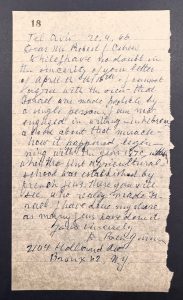Hannah Szenes was a Zionist hero. Born in Hungary in 1921 to a wealthy and assimilated family, after experiencing antisemitism she became a Zionist and made aliyah to Palestine, arriving in 1939.
In 1943, she approached the Jewish Agency to see if she could help the resistance movements in Europe. She was trained as a paratrooper and dropped into Yugoslavia in March 1944 to assist anti-Nazi forces and to aid in the rescue of Hungary’s Jews. She was one of 33 people sent on active missions in an initiative with the British to create a joint commando unit within the British army.
Szenes was captured shortly after crossing the border into Hungary and held as a prisoner in Budapest. The authorities tortured her to disclose the code to the transmitter she carried so that the Hungarians could trap others, but she would not break, even after her mother was arrested and brought to the same prison. Szenes was convicted of treason against her home country of Hungary and sentenced to death. She refused a last-minute opportunity for clemency, and was executed by firing squad on Nov. 7, 1944. Szenes was reburied on Mount Herzl in 1950 and in 1993 was exonerated by a Hungarian military court.
This stamp was issued by the Jewish National Fund in 1946 to honour Szenes and six other paratroopers and emissaries who were sent to support the Jewish communities of Europe during the Holocaust.
Szenes studied agriculture and was also a poet and playwright. Her best known poem is a “Walk to Caesarea” which is commonly known as “Eli, Eli” (“My God, My God”) which reads:
My God, My God
May these things never end:
The sand and the sea
The rustle of the water
The lightning in the sky
Man’s prayer
Put to music by composer David Zahavi, the song is an unofficial anthem of Israel and one of the most commonly played songs in Israel on Holocaust Remembrance Day.
Toronto singer Sophie Milman also recorded a version of “Eli, Eli”







